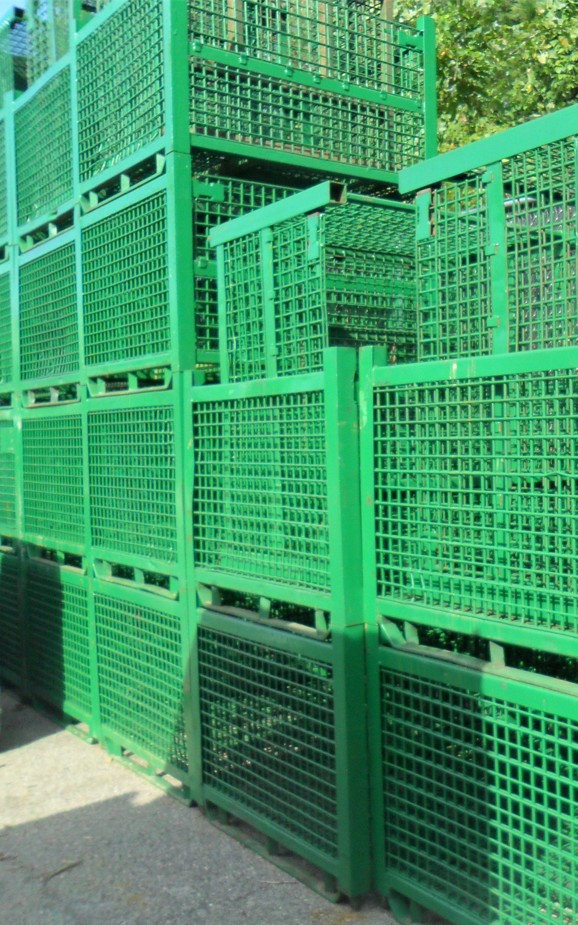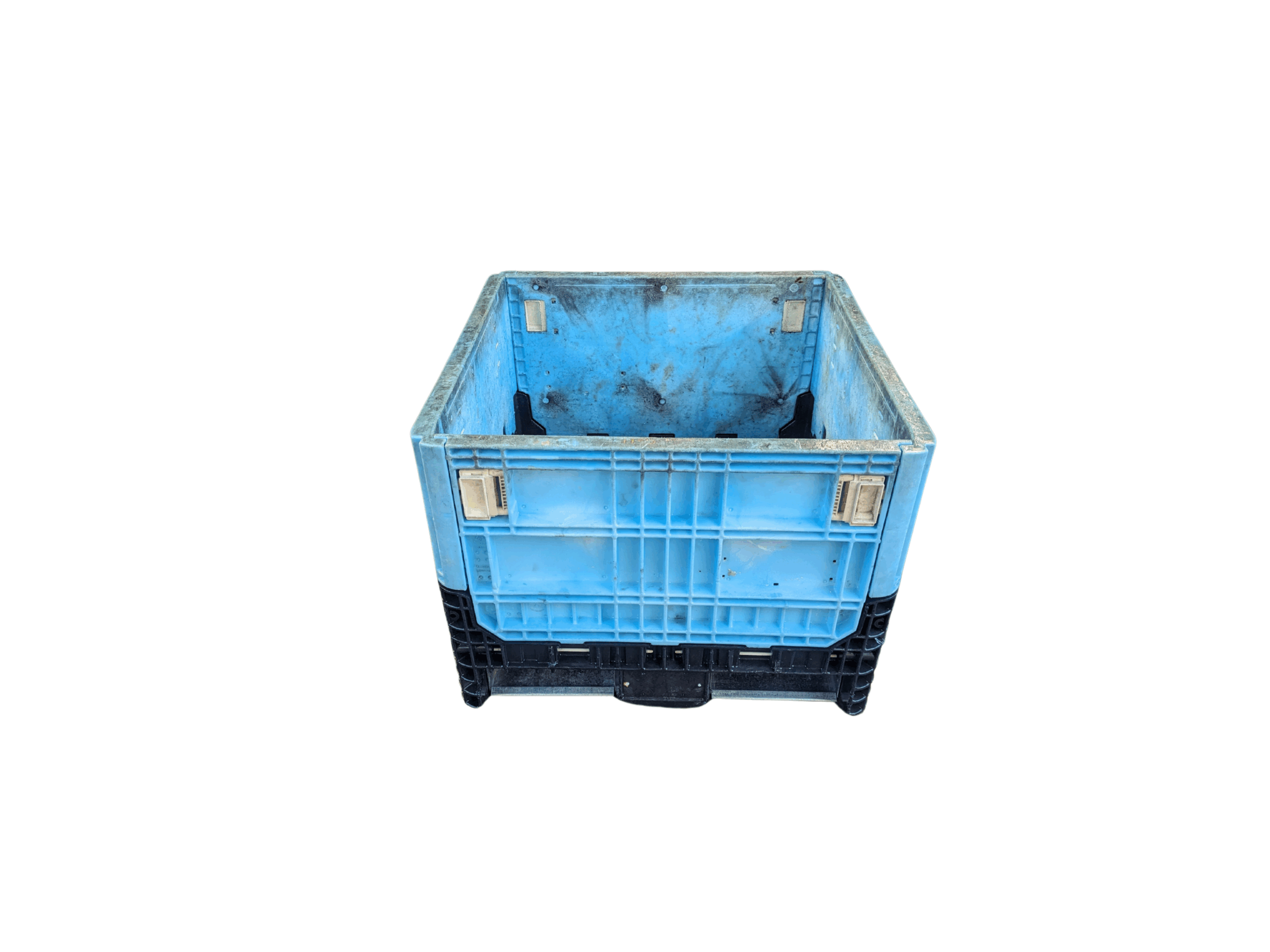Top reasons to choose used bulk containers for practical business operations
Wiki Article
Why Bulk Containers Are Vital for Affordable and sustainable Transportation
Bulk containers play an essential duty in modern-day logistics. They promote the efficient activity of huge quantities of items, consequently enhancing transportation processes. This technique not only lowers prices but additionally lessens environmental influence with reduced discharges and waste generation. As industries look for more lasting practices, the fostering of bulk containers is coming to be increasingly substantial. What implications does this change hold for future logistics and supply chain management?
The Advantages of Utilizing Mass Containers in Logistics
Bulk containers transform logistics by improving effectiveness and sustainability. These containers enable for the transport of big amounts of products in a single trip, substantially decreasing the variety of journeys required. This not only streamlines operations yet also minimizes labor prices connected with handling, filling, and unloading. Additionally, bulk containers are designed to maximize area use within transportation cars, ensuring that even more products can be shipped all at once.The standardization of mass containers additionally streamlines the logistics procedure. With consistent measurements, they can be quickly stacked and saved, causing boosted stockroom monitoring. In addition, mass containers usually feature durable products that protect materials from damages throughout transportation, consequently decreasing item loss and boosting general dependability. Therefore, businesses can experience boosted supply chain performance, eventually leading to boosted profitability and client complete satisfaction. This mix of elements makes mass containers an important property in modern logistics.
Ecological Effect: Reducing Waste and Carbon Footprint
As markets increasingly focus on sustainability, the adoption of mass containers has arised as an essential strategy for minimizing waste and lowering carbon footprints. These containers minimize the usage of packaging materials, such as boxes and plastic, therefore notably lowering overall waste generation. By consolidating shipments, mass containers improve transport efficiency, enabling even more items to be moved per journey. This reduction in journeys directly correlates with reduced greenhouse gas discharges, adding to a smaller sized carbon impact.Bulk containers can frequently be reused or reused, even more minimizing environmental impact. The sturdiness of these containers guarantees they can stand up to multiple transport cycles, decreasing the demand for single-use options. refurbished bulk containers. By improving logistics and advertising effective source usage, mass containers not just sustain lasting techniques yet also encourage industries to align with worldwide ecological goals. Eventually, their application shows a commitment to eco-friendly stewardship and liable source administration
Expense Savings: How Mass Containers Lower Transportation Expenses
While numerous business seek ways to enhance their lower line, the usage of mass containers provides a significant possibility for reducing transport expenditures. Mass containers maximize the quantity of products delivered, enabling companies to ship larger amounts at when. This efficiency minimizes the variety of trips called for, directly decreasing gas prices and decreasing labor costs connected with loading and dumping.In addition, bulk containers frequently feature structured layouts that enhance space use within transportation lorries. This suggests fewer vacant areas, causing more efficient use of offered capacity. The durability of mass containers can decrease the threat of product damages during transportation, ensuring and minimizing losses that even more goods arrive undamaged.
Enhancing Supply Chain Performance With Mass Storage Space Solutions
Bulk storage space services play a vital role in boosting supply chain efficiency by optimizing supply monitoring. By consolidating products right into fewer, larger containers, companies can greatly decrease taking care of prices related to regular transfers and handling. This structured strategy allows for much better monitoring and monitoring of inventory, ultimately bring about boosted functional performance.Streamlined Inventory Management
Reliable supply monitoring is crucial for maximizing supply chain procedures, specifically when organizations adopt bulk storage solutions. These remedies make it possible for organizations to maintain higher stock degrees while decreasing the regularity of replenishment. By combining products right into mass containers, firms can streamline their inventory procedures, lowering the intricacy linked with tracking numerous smaller sized bundles. This method facilitates accurate inventory matters and enhances forecasting precision, enabling more enlightened decision-making. On top of that, mass storage space options simplify storehouse company, making it less complicated to locate and gain access to items when needed. Consequently, companies can achieve a much more reliable supply turnover rate, eventually boosting general supply chain see it here efficiency and minimizing the possibility of stockouts or overstock circumstances.
Reduced Handling Expenses
The execution of mass storage space options not only used collapsible containers simplifies supply management however additionally significantly lowers handling expenses throughout the supply chain. By combining materials into mass containers, firms minimize the requirement for constant handling and transfer in between different storage and transportation systems. This strategy minimizes labor costs related to loading, dumping, and moving smaller bundles. Furthermore, mass storage space minimizes the regularity of deliveries, causing reduced transport prices and lowered gas usage. Because of this, services can enhance their logistics operations, permitting a much more effective allowance of sources. Eventually, decreased handling prices add to boosted total supply chain performance, promoting an atmosphere that supports both sustainability and economic viability.
Convenience of Bulk Containers Across Numerous Industries
Lots of sectors have distinctive requirements for transportation and storage, mass containers have arised as a flexible solution that satisfies a wide range of requirements. These containers, varying from big bins to specialized containers, can fit varied products, consisting of granules, powders, and liquids. In the agricultural sector, bulk containers promote the transport of fertilizers and grains, while the food and beverage industry utilizes them for active ingredients and finished products. The chemical sector relies upon mass containers for safely delivering unsafe products, making certain conformity with safety and security guidelines. Furthermore, building and construction firms gain from bulk containers for carrying aggregates and other materials. Their adaptability expands to numerous settings of transportation, consisting of trucks, trains, and ships, boosting logistical effectiveness. This flexibility not only enhances operations throughout different fields yet likewise promotes sustainability by decreasing packaging waste and enhancing room in transportation. Mass containers play a necessary duty in contemporary supply chain management.Future Trends in Mass Container Usage and Sustainability
The future of mass container usage is significantly formed by cutting-edge products advancement that boosts sustainability. Additionally, automation in logistics promises to enhance operations, decreasing waste and improving performance. Accepting round economic climate practices will further reinvent just how bulk containers are developed, utilized, and recycled, promoting an extra sustainable transportation landscape.Cutting-edge Materials Advancement
As sectors progressively prioritize sustainability, cutting-edge materials advancement wholesale containers becomes a substantial consider improving environmentally friendly transport options. Scientists and manufacturers are checking out eco-friendly plastics, recycled compounds, and lightweight steels to reduce ecological effect. These products not only reduce waste yet additionally improve fuel performance by decreasing the total weight of containers. Additionally, developments in clever products, which can adjust to differing problems, boost the sturdiness and performance of mass containers. The integration of these cutting-edge products lines up with round economic situation concepts, advertising reuse and recycling. As the need for lasting methods expands, the development of such products will play a crucial function fit the future of bulk container usage in logistics and transportation.Automation in Logistics
Significant developments in automation are poised to transform logistics and the utilization of mass containers, enhancing sustainability in transportation. Automated systems, including drones and independent lorries, are simplifying the activity of mass containers, minimizing the reliance on conventional fuel-powered transport. These modern technologies optimize transmitting and filling procedures, reducing empty miles and boosting gas efficiency. Furthermore, Visit Website automated inventory monitoring systems boost tracking and monitoring of mass containers, making certain far better resource allocation and reduced waste. The assimilation of the Web of Things (IoT) permits real-time data evaluation, making it possible for positive decision-making that lines up with sustainability goals. As automation remains to progress, it is expected to drive better advancements wholesale container use, eventually sustaining more lasting logistics methods and reducing the ecological impact of transport.Round Economic Climate Practices
Advancements in automation are setting the phase for a more incorporated technique to round economic situation practices in the domain name of mass container usage. As markets significantly accept sustainability, bulk containers are being made for longevity and reusability. This change not just reduces waste yet likewise enhances resource effectiveness. Companies are embracing methods such as closed-loop systems, where used containers are gathered, refurbished, and reestablished right into the supply chain. In addition, wise modern technologies track container life cycles, facilitating much better administration and decreasing ecological effect. The partnership between suppliers, logistics service providers, and end-users is important in establishing criteria for lasting container usage. used collapsible containers. Future fads show a growing emphasis on products that are recyclable and eco-friendly, further reinforcing the circular economic climate's concepts in mass transport-400x300.webp)
Often Asked Inquiries
What Materials Are Mass Containers Normally Made From?
Mass containers are typically created from long lasting materials such as high-density polyethylene, aluminum, cardboard, and steel. These materials supply flexibility, toughness, and protection, making them appropriate for moving various goods in various sectors successfully.Just how Do I Pick the Right Dimension Mass Container?
Picking the appropriate dimension mass container entails reviewing the volume of materials to be carried, taking into consideration handling equipment compatibility, and assessing storage area demands. Correct dimension warranties performance in transport and decreases waste during shipment.Are Bulk Containers Reusable or Recyclable?
Bulk containers are frequently reusable, developed for several trips, improving sustainability. Numerous can likewise be recycled, depending upon the materials utilized. Selecting recyclable options even more lowers and sustains ecological objectives waste in transport methods.What Security Laws Apply to Mass Container Transport?
Security guidelines for bulk container transportation consist of compliance with the Department of Transportation standards, correct labeling of harmful products, structural integrity analyses, and adherence to weight limitations to guarantee secure handling and protect against mishaps during transportation.How Can Organizations Shift to Using Bulk Containers Effectively?
Services can alter to bulk containers by reviewing existing logistics, training team on handling, investing in appropriate tools, optimizing inventory administration, and collaborating with providers to ensure compatibility and performance throughout the supply chain.
As industries progressively prioritize sustainability, the adoption of bulk containers has arised as a key strategy for minimizing waste and lowering carbon impacts. By settling materials right into bulk containers, firms can streamline their inventory processes, lowering the complexity associated with tracking several smaller sized plans. As industries significantly prioritize sustainability, cutting-edge materials advancement in mass containers emerges as a substantial factor in improving environmentally friendly transport solutions. Automated systems, including drones and self-governing vehicles, are streamlining the motion of bulk containers, lowering the dependence on conventional fuel-powered transportation. Furthermore, automated supply management systems improve tracking and tracking of mass containers, guaranteeing better resource allocation and minimized waste.
Report this wiki page